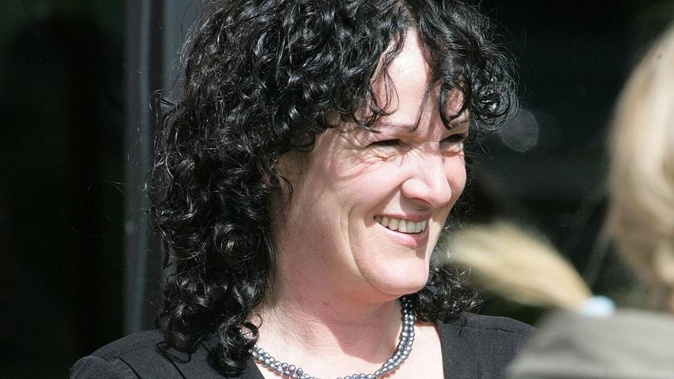
A Waikato man who shot his wife dead after she told him she wanted to end their marriage has made “no real progress” in prison and has been refused parole.
Greg Meads gunned down Helen Meads at their Matamata home in September 2009.
Meads, a well-known horse breeder, was charged with murder and it later emerged that their marriage had been rife with domestic violence and the last fatal assault came after she announced she was leaving him.
While he admitted to shooting her, he claimed it was an accident - that he went to confront her about why she was leaving him and took the loaded gun but it went off by mistake.
/cloudfront-ap-southeast-2.images.arcpublishing.com/nzme/NNFGMTRFHDVG5FZSZEENUGNPLQ.jpg)
Murderer Greg Meads. Photo / NZH
But after a high-profile High Court trial Meads was found guilty of Helen’s murder.
He was jailed for life and ordered to serve a minimum of 11 years before he could apply for parole.
For many years he maintained that shooting Helen was an accident - but last year he told the Parole Board his actions were deliberate.
“I have come to terms with the fact that when I had my hand on the gun it was a voluntary act and I’ve pulled the trigger,” he said at a hearing in February last year.
“It’s not an accident, I admit that now… I think it was deliberate that I grabbed the trigger and that was the end of Helen’s life.”
But when pressed by the board, Meads conceded he had only decided in the previous 12-24 hours to take responsibility.
Parole Board chairman Sir Ron Young said the sudden admission was “worrying” and he “expressed concern about the genuineness” of it.
Meads was refused parole at that hearing and told to “work on a one-to-one basis with a psychologist” around the newly emerged narrative of the deliberate killing.
Meads, now 68, appeared before the board again last month - and was again refused release from prison.
Sir Ron said Meads’ psychologist had provided a report to the board that noted the convicted murderer “focussed on the technical aspects of the killing rather than the emotional”.
“He was still very focussed on such things as his attempts to help his children rather than their loss,” he said in a parole decision released to the Herald this week.
“Overall, the psychologist concluded that no real progress had been made in terms of Mr Mead identifying the kind of emotions that were present in the months, weeks, days and hours leading up to the offending.
“In particular, the psychologist said that Mr Meads was steadfast in his view that, at no time, had he any thoughts or intentions of wanting to do any harm to the victim, even as a conflicted or dismissed thought in a moment leading up to the offending.”
Meads claimed that killing Helen was the result of “concern and confusion” and the psychologist said he had “no awareness that he had hostile emotions around anger and betrayal”.
“We spent a significant time trying to understand Mr Meads’ position as to what exactly he felt leading up to the killing,” said Young.
“Initially, he said that he took the gun to try and ensure that when he discussed his concerns with his wife, she would tell him the truth.
“But, as we pointed out to him, immediately after he entered the stable with the gun… he immediately fired the gun and killed his wife.
“Accordingly, there was no question at that stage of any discussion with his wife by using the gun to try and convince her that she should be honest with him.”
Young said during the board’s discussion with Meads - after a “significant period of questioning” - he did identify important factors that led to him killing Helen.
“He felt betrayed by his wife; he was concerned that her leaving him would cause a loss of family; he felt abandoned by her and no longer loved her; he was anxious; somewhat depressed, sleep-deprived and, immediately before the killing angry,” Young said.
He said because Meads - again - had not discussed any of those factors with the psychologist, more work was needed before he could be considered for parole.
“The psychological report was written on the basis that Mr Meads’ insight into his emotions, actions and thoughts immediately before the offence remained stuck in the way that we have previously described,” said Young.
“As the psychologist said, if further work was to be undertaken it would need a different response where Mr Meads would step beyond his demonstrated style of rigidity, narrowness and defensiveness and be prepared to acknowledge the emotions he had.”
“Assuming the description of emotions provided to [the board] by him are accurate and truthful”, Young said, the best way forward was to spend the next six months working closely with the psychologist in prison.
During that time Meads should focus on “dealing with the issues… and the emotions he has identified”.
/cloudfront-ap-southeast-2.images.arcpublishing.com/nzme/5QZKMBNBCFKZIF42YGFRI7DWJE.jpg)
Helen Meads with her daughter Kimberley.
The psychologist had told the board before Meads’ new admission that given he had not acknowledged “the emotions that were likely present” at the time of the offending and “given his enduring personality features” a “significant period of time” would likely be required for any counselling.
However, Young said after the recent hearing the board found itself in a different position with Meads’ “acknowledgement of a range of emotions leading up to the murder”.
He said if Meads’ engaged well in the psychological one-on-one treatment over six months and progressed - and had a strong release plan including how the psychological work could continue in the community - he could well be released.
He also acknowledged “a number of positive features” for Meads.
Those included having a “supportive family” who were “well versed in what is needed to support him”.
“His family are well aware of his risks and their role in supporting him,” said Young.
“He has a safety plan which will work well if, indeed, the emotions he identifies are worked on with the psychologist.”
For now though, Meads remains an undue risk to the safety of the community and cannot be released.
He will next appear before the board in October.
FAMILY VIOLENCE - DO YOU NEED HELP?
Where to go for help or more information:
- Shine, free national helpline 9am- 11pm every day - 0508 744 633 www.2shine.org.nz
- Women’s Refuge: Free national crisis line operates 24/7 - 0800 refuge or 0800 733 843 www.womensrefuge.org.nz
- Shakti: Providing specialist cultural services for African, Asian and middle eastern women and their children. Crisis line 24/7 0800 742 584
- It’s Not Ok: Information line 0800 456 450 www.areyouok.org.nz
Take your Radio, Podcasts and Music with you









